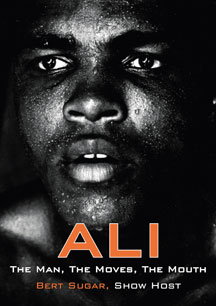By: Staff
In commemoration of the 50th anniversaries for the Beatles and Ali, Music Video Distributors (MVD) has announced the release of two documentaries on DVD: The Beatles: Their Golden Age (one hour, $9.95) and Ali: The Man, The Moves, The Mouth (one hour, $9.95). The Ali DVD documentary is narrated by one of boxing’s most-acclaimed sportscasters, Bert Sugar, and is one of his last works before his death in March.
In August of 1962, Ringo Starr replaced drummer Pete Best in an English band that few Americans knew of then, completing what would soon be the biggest entertainment act in history, the Beatles. Soon after, young Cassius Clay (later known as Muhammad Ali) began training for his biggest fight to date, a bout with the former heavyweight champion of the world, Floyd Patterson, who he would defeat handily when they met the following month. The news crews of the day couldn’t get enough of the two events, and those unassuming, yet ballyhooed beginnings changed popular culture and sports forever!
The Ali documentary is based on a book of like title by Les Krantz, who also produced the documentary. In it, are highlights of all of Ali’s biggest fights, including “The Fight of the Century,” in 1971, in which two undefeated heavyweight champions, Ali and Joe Frazier, amazed fans with their stamina and tenacity.
 Ali, the dethroned heavyweight champion, had lost his boxing license earlier when he refused to be inducted as a draftee into the U.S. Army. With Ali absent, Frazier had won the championship in 1970. You’ll witness Frazier beat Ali in the 1971 bout in this documentary, but, in their rematch, “The Thrilla in Manilla,” Ali came back to win over Frazier. Both matches are on the DVD. Hyping the rematch, Ali states on camera, “It’ll be a thrilla and a killa and a chilla when I get the Gorilla in Manilla.” Also included is “The Rumble in Jungle” in Zaire where Ali retook the championship, defeating George Foreman.
Ali, the dethroned heavyweight champion, had lost his boxing license earlier when he refused to be inducted as a draftee into the U.S. Army. With Ali absent, Frazier had won the championship in 1970. You’ll witness Frazier beat Ali in the 1971 bout in this documentary, but, in their rematch, “The Thrilla in Manilla,” Ali came back to win over Frazier. Both matches are on the DVD. Hyping the rematch, Ali states on camera, “It’ll be a thrilla and a killa and a chilla when I get the Gorilla in Manilla.” Also included is “The Rumble in Jungle” in Zaire where Ali retook the championship, defeating George Foreman.
Lots of rare footage distinguishes this documentary from other films about Ali’s career. “Most Americans today don’t realize that Ali spent a lot of time in Britain in the beginning of his boxing career,” Krantz said. “We used some superb footage of Ali shot over in England where he had some early professional fights.” The Brits were curious about this outspoken black man whose brash style was not what British TV viewers were used to seeing. “The British footage is why our documentary has a bit of a different look than other Ali films,” Krantz said, “so it has a lot of Ali footage that most Americans haven’t seen.” In addition to highlights of fights with Englishmen Henry Cooper and Joe Bugner, Ali offers plenty of his amusing quips in the documentary.
Ali’s rhetoric was colorful. “I’m the King!” he shouts in one scene shot in London, as he hyped a fight. “You got a queen, but you ain’t got no King! I’m the King!” Almost as colorful as Ali is the documentary’s narrator Bert Sugar who perpetually wore a trademark fedora hat and almost always had a fat cigar he’d wiggle at you. Sugar had a special relationship with Ali. In order to make his calls better when he covered an Ali fight, the sportscaster once sparred with the Ali . . . just to learn what it might be like. When he spoke of it, he’d raise his fists to demonstrate how he jabbed at Ali and he’d bob and weave like a prize fighter as he gave his account. “Seeing Bert, with his ‘dukes up,’ ready to poke you,” Krantz said, “was an intimidating experience, even though he was seventy something when he did with me.”
“You can’t imagine what a thrill it was for me, ” producer Krantz said, “to work on back-to-back documentaries of the heroes of my youth, Ali and the Beatles.
The latter work, The Beatles: Their Golden Age, tells the story of the Beatles from their beginning in 1960s, thru Ringo joining the group in 1962, to the very end in 1970 when the Beatles broke up. In addition to their world tours, the documentary has highlights of their movies, all five of them. You’ll witness them dancing and singing their way across the screen, including a portion on the making of their first movie, A Hard Day’s Night. Also included are scenes from Help!, Yellow Submarine, Magical Mystery Tour, and Let it Be.
Not every scene in the Beatles documentary is as familiar as the boys’ movies. Rare footage in Krantz’s documentary include John Lennon reading his from his poetry book; Paul McCartney angrily lecturing a newsman about revealing his LSD usage; George Harrison batting his eyes at his new wife Patty Boyd, and Ringo clowning around in the Irish countryside with the other Beatles. “We liked to show a side of the boys that was seldom very public,” Krantz said. The famous scenes are here too: a repentant John explaining his remark that the group was “bigger than Jesus;” the Beatles arriving in London as they returned from their world tour, and their triumphant return to their hometown, Liverpool.